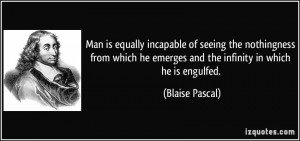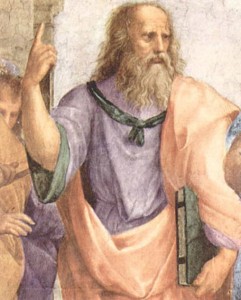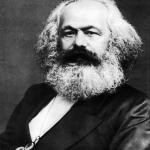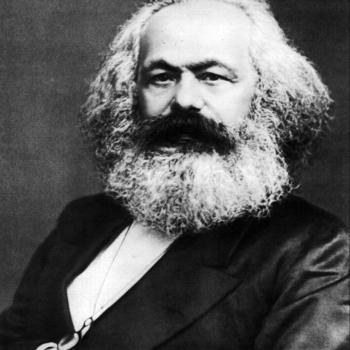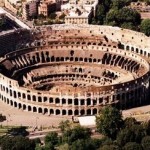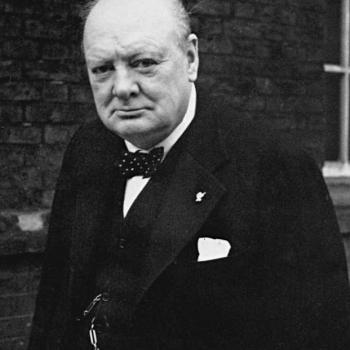This is my attempt to introduce something of the point of view that will inform this new blog. (I thank our hosts at Patheos for the opportunity, as well as my LDS friends and fellow bloggers who have preceded me here.) No doubt I will attempt other “introductions” — especially since, upon review, this little ditty is not quite as “introductory” as I might wish. So let me try to make amends in advance to any reader who might find this post hard to follow by stating as plainly as possible the point I try to develop below:
Religious (and philosophical) beliefs are naturally bound up with political assumptions and opinions — understandings of human excellence and of the good community. As Plato saw 2300+ years ago, the soul is always defined in relation to the city — and vise versa.
So now to the slightly longer form of the argument. And examples and illustrations will follow, of course, in future posts.
If man were completely ignorant of himself, he would not be poetic; for one cannot depict what one has no idea of. If he saw himself clearly, his imagination would remain idle and would have nothing to add to the picture. But man is uncovered enough to perceive something of himself and veiled enough so that the rest is sunk in impenetrable darkness, into which he plunges constantly and always in vain, in order to succeed in grasping himself.
–Alexis de Tocqueville, Democracy in America
It is hard to disagree with Pascal’s famous observation that we know too little to be dogmatists and too much to be skeptics, but it is even harder to know what to do with this insight, or to know where it leaves us. But we can say that where it leaves us is at the threshold of three human possibilities: we are poetic, we are philosophical, and we are political beings.
We are poetic beings because we are productive of meaning: our very existence secretes meaning; we cannot exist without acting, we cannot act without imagining, that is, without conceiving purposes. And we cannot conceive purposes without conceiving (however dimly and implicitly) some understanding of the Whole, of the way things our and of our place in the whole among the things that are.
Philosophy is the natural (albeit rare) extension of this natural interest in conceiving the whole, which cannot be severed from our interest in understanding our place in the whole (and the whole’s place in us), from man’s interest, as Tocqueville says, “in grasping himself.”
We are political beings because this natural interest in understanding the whole and our place in it can never be consummated. This failure fully to grasp ourselves or the elusive whole in which we find ourselves leaves us dependent upon the conventional wholes – the practical orders — which precede us and in which we live, breathe and have our being. Just as every idea of God as “Father” cannot avoid deriving meaning from our concrete, mortal experience of fatherhood (and the same can be said, mutatis mutandi, for motherhood), so every idea of Zion or of Celestial Glory must draw upon notions of justice and the common good that arise from our political speech and action, from the fundamentally political condition of our humanity.
We are beings open to—or vulnerable to– the claims of revealed religion because neither poetry, nor philosophy, nor politics can fully respond to our interest in meaningful action, and thus in understanding the whole and our place in it, in grasping what is and in grasping ourselves.
I do not say that this interest in “grasping,” in comprehending the whole and our place in it can ever be absolutely fulfilled, or even that we can coherently wish for such a fulfillment. The openness of the whole to the creative action of unique personal agents, to development or even, yes “progress,” is a true insight by which Christianity definitively surpassed the greatest wisdom of the pagans. Of course this Christian insight was largely suppressed or covered over in traditional rational theology, which had to borrow fundamental categories from Greek philosophy. And this is precisely where the distinctive resources of Latter-day Saint doctrine come into view: No body of belief that I know of equals LDS belief in its capacity to sustain an equilibrium between the cosmos as a stable form of meaning and the openness of being to the creative choices of persons.
But both this stable form (“Eternal Law”) and this openness (“Eternal Progress”) must be understood through an ongoing engagement with both the moral presuppositions and the progressive hopes of our political world. Whether by refining our politically-conditioned common sense, or by extracting our eternal laws and hopes from defective political models, reflection on our political condition and our political situation is inherent in theological reflection.
Thus the insight, so famously inaugurated in Plato’s Republic, that our understanding of the soul is deeply implicated in our understanding of the city, and vise versa, seems to me eternally relevant. We ignore the necessary political bearing of our religious beliefs at our peril — our spiritual as well as political peril.
This probably all seems quite abstract and removed from concrete religious and political concerns. But as I say, examples, illustrations and developments will follow.

